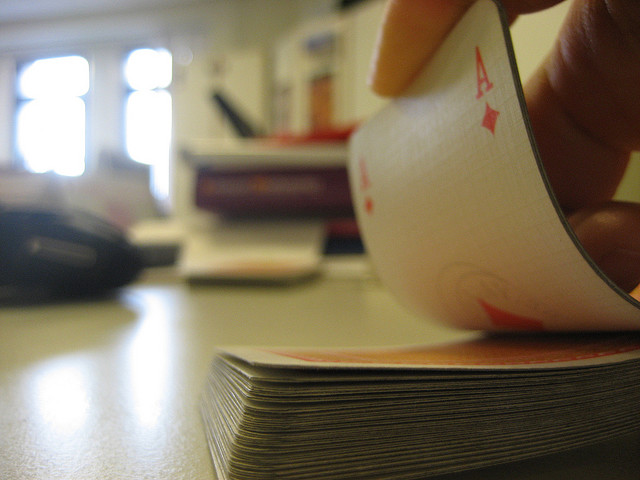Blog
Busting the Myths of Card Counting
05/18/2011 13:23Card counting is a strategy for Blackjack and Spanish 21, games where the players and dealers try to win hands of twenty-one with as little cards as possible. The strategy follows the basic principle that high cards such as aces and tens are more valuable to the player while lower cards such as twos, threes, and fours are more valuable for the dealer. More aces and tens yield a higher chance for a Blackjack. More ten-value cards make an insurance bet much more beneficial, as it is in essence a bet that the dealer's hand contains a ten. The dealer's possession of low cards is good for the dealer because he or she can only call "hit"--which is a move in Blackjack that asks for another card to be added--on hands that total between twelve and sixteen. These hands are called "stiff" hands. The player can call "hit" or "stand"--stay--on their hand regardless of the total. Tens bust stiff hands, or make them total over the limit of twenty-one, and thus increase the chances of the dealer losing.
Many people falsely believe that card counters require unusually high mental abilities, assuming that they are memorizing specific cards and their places. In reality, card counters assign each card a point score that is an approximation of that card's value. It is the sum of these cards that they track and memorize. This myth was perpetuated by the 1988 American film Rain Man.
Another complete myth also supported by Rain Man is that card counting is illegal in the United States. Card counting without use of an outside device, such as an iPhone application that was banned in Nevada, is absolutely legal. However, despite its legal status, casinos almost always employ countermeasures to card counting. Some of these countermeasures include, but are not limited to: harassment of card counters by casino staff, shuffling when an increase in a wager occurs, scanners that search for use of electronic card counting devices, and surveillance cameras to monitor suspects. Some states do not ban these countermeasures at all, like Nevada, while others, like New Jersey, severely restrict them.
Card counting was initially developed by an American mathematician named Dr. Edward O. Thorpe. He wrote a book called Beat the Dealer in 1962 that offered numerous betting and counting strategies for players to gain an upper-hand when playing Blackjack and its derivative games. Some of these strategies have been rendered obsolete by casino countermeasures, such as one involving the dealer dealing to the last card, while others remain sound.
There have been no arrests as a direct cause of card counting in casinos anywhere in the United States. There have, however, been arrests when a casino banned a card counter from entering the premises and this ban was not respected. There have also been several arrests in relation to illegal card counting devices. In September of 2008, four patrons at a Mohegan Sun Casino were taken into custody and held on a $10,000 bond for using electronic devices to aid in card counting for the game known as baccarat. These patrons used the devices to determine the order of the cards before they were handed out.
While card counting is not illegal, any Blackjack aficionado hoping to utilize it should do their research on strategies and the policies their casino of choice holds regarding it. Not many casinos take kindly to it, but if it's done subtly and without the aid of an outside device, card counting can be wildly profitable.
---
Northern Quest Resort and Casino, one of the highest rated Airway Heights and Spokane hotels offers unique and exciting entertainment.
* image courtesy of <a href="https://www.flickr.com/photos/cristic/369634461/" target="_blank">ccarlstead</a>

